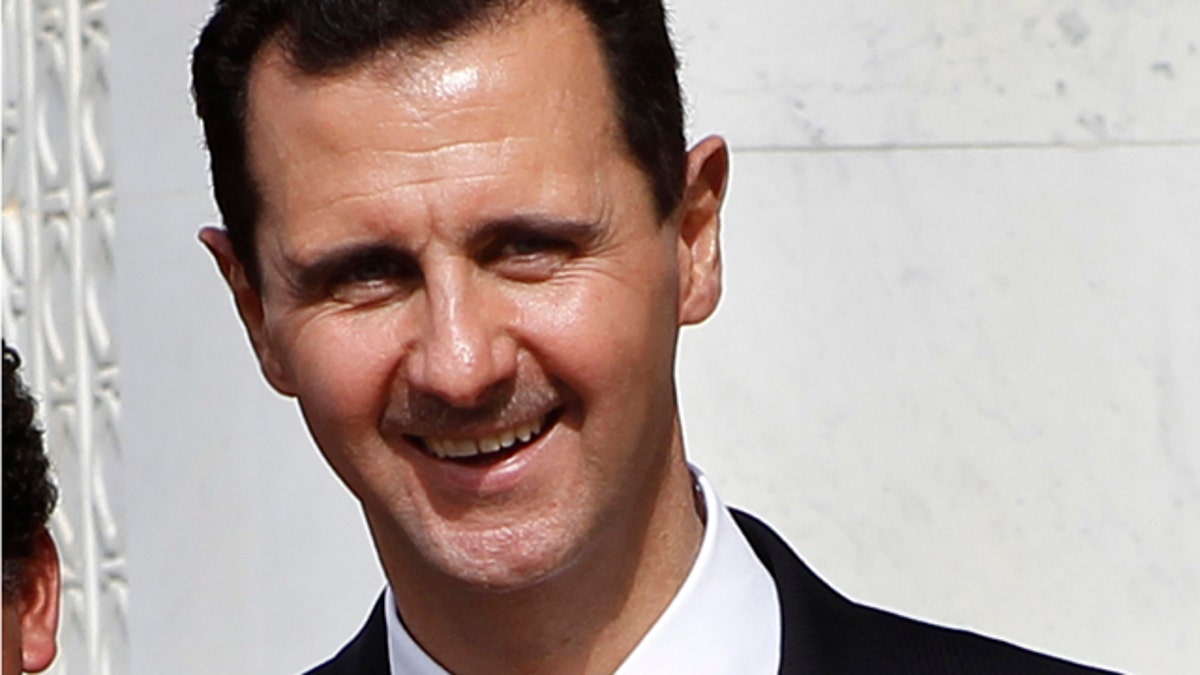
FILE 2010: Syrian President Bashar Assad. (AP)
BEIRUT – Syria's president denied he ordered the deadly crackdown on a nearly 9-month-old uprising in his country, claiming he is not in charge of the troops behind the assault.
Speaking to ABC's Barbara Walters in a rare interview that aired Wednesday, President Bashar Assad maintained he did not give any commands "to kill or be brutal."
"They're not my forces," Assad responded when asked if Syrian troops had cracked down too hard on protesters. "They are military forces (who) belong to the government. I don't own them. I'm president. I don't own the country."
He said some Syrian troops may have behaved badly, but they faced punishment.
In his role as president, Assad is the commander of Syria's armed forces.
The U.N. estimates more than 4,000 people have been killed in Syria since the uprising began in March, many of them civilians and unarmed protesters demanding Assad's ouster.
"Who said the United Nations is a credible institution?" Assad said, when Walters asked him about allegations of widespread violence and torture.
"We don't kill our people," said Assad, a 46-year-old, British-trained eye doctor. "No government in the world (kills) its people unless it is led by a crazy person."
Since the uprising began nearly nine months ago, Assad and his closest advisers have sealed off the country to outsiders while clinging to the allegation that foreign extremists are behind the uprising, not true reform-seekers aiming to open the authoritarian political system.
But the United Nations and others dismiss the government's claims, and blame the regime for widespread killings, rape and torture. Witnesses and activists inside Syria describe brutal repression, with government forces firing on unarmed protesters and terrifying, house-to-house raids in which families are dragged from their homes in the night.
State Department spokesman Mark Toner said Assad was trying to shirk responsibility.
"I find it ludicrous that he is attempting to hide behind some sort of shell game but also some sort of claim that he doesn't exercise authority in his own country," Toner said.
Murhaf Jouejati, a Syria expert at George Washington University, said Assad's stonewalling is part of a long tradition for dictators who refuse to accept responsibility.
He pointed to Assad's uncle, Rifaat, believed to be a driving force behind the 1982 massacre of thousands in the city of Hama, one of the darkest moments in the modern Middle East.
"Bashar Assad said he is not responsible, and we heard his uncle Rifaat Assad say he was not responsible for Hama. So after 41 years the Assad family is not responsible for anything," Jouejati said. "If he is not responsible then we don't know what he is doing in the presidency."
In the early days of the uprising, Assad offered some promises of reform -- but at the same time he unleashed the military to crush the protests with tanks and snipers.
The relentless bloodshed has pushed many once-peaceful protesters to take up arms. Army dissidents who sided with the protests have also grown bolder, fighting back against regime forces and even attacking military bases and raising fears of a civil war.
Still, Assad insisted he still had the support of Syrians, and said he was not afraid of meeting the fate of other leaders deposed during the Arab Spring.
"The only thing that you could be afraid of as president (is) to lose the support of your people," he said.
"If you don't have the support of the people you cannot be in this position," he said. "Syria is not easy ... it is a very difficult country to govern if you don't have the public support."
Assad laughed slightly when asked if he felt guilty about the bloodshed.
"I did my best to protect the people," he said. "You cannot feel guilty when you do your best ... you do not feel guilty when you don't kill people. You feel sorry for the lives that have been lost but you don't feel guilty."




















